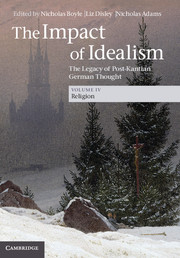Book contents
- Frontmatter
- Contents
- List of Contributors
- Acknowledgements
- List of Abbreviations
- Introduction: the impact of Idealism on religion
- 1 The impact of Idealism on Christology: from Hegel to Tillich
- 2 German Idealism's Trinitarian legacy: the nineteenth century
- 3 German Idealism's Trinitarian legacy: the twentieth century
- 4 Kierkegaard, Hegelianism and the theology of the paradox
- 5 Biblical hermeneutics: from Kant to Gadamer
- 6 Aesthetic Idealism and its relation to theological formation: reception and critique
- 7 The autonomy of theology and the impact of Idealism: from Hegel to radical orthodoxy
- 8 Faith and reason
- 9 Rabbinic Idealism and Kabbalistic realism: Jewish dimensions of Idealism and Idealist dimensions of Judaism
- 10 ‘In the arms of gods’: Schelling, Hegel and the problem of mythology
- 11 Dialectic and analogy: a theological legacy
- Bibliography
- Index
- References
9 - Rabbinic Idealism and Kabbalistic realism: Jewish dimensions of Idealism and Idealist dimensions of Judaism
Published online by Cambridge University Press: 05 December 2013
- Frontmatter
- Contents
- List of Contributors
- Acknowledgements
- List of Abbreviations
- Introduction: the impact of Idealism on religion
- 1 The impact of Idealism on Christology: from Hegel to Tillich
- 2 German Idealism's Trinitarian legacy: the nineteenth century
- 3 German Idealism's Trinitarian legacy: the twentieth century
- 4 Kierkegaard, Hegelianism and the theology of the paradox
- 5 Biblical hermeneutics: from Kant to Gadamer
- 6 Aesthetic Idealism and its relation to theological formation: reception and critique
- 7 The autonomy of theology and the impact of Idealism: from Hegel to radical orthodoxy
- 8 Faith and reason
- 9 Rabbinic Idealism and Kabbalistic realism: Jewish dimensions of Idealism and Idealist dimensions of Judaism
- 10 ‘In the arms of gods’: Schelling, Hegel and the problem of mythology
- 11 Dialectic and analogy: a theological legacy
- Bibliography
- Index
- References
Summary
For over two centuries, Jewish philosophy and post-Kantian Idealism have been intertwined. Habermas has rightly noted ‘the German Idealism of the Jewish philosophers’, asking how, given the Christian or post-Christian character of Idealism, this intimacy is possible. In what follows, I offer an answer. First, however, I will deepen the puzzle. For what is internal to Idealism is not only Christianity or post-Christianity, but specifically the claim that Christianity or post-Christianity has superseded Judaism. Accordingly, Idealism constitutes a challenge to Judaism, which must justify its continued existence in the modern world. This makes it more puzzling that Idealism has attracted so many Jewish philosophers. To solve this puzzle, it is necessary to show that both Kantian and post-Kantian Idealism have what I will call Jewish dimensions – namely, rabbinic Idealism and Kabbalistic realism. By articulating these dimensions, Jewish philosophy has contributed to the inner development of Idealism. Moreover, by re-appropriating these dimensions as Jewish, Jewish philosophers have found within Idealism the resources to respond to the Idealist challenge, by demonstrating that Judaism has not been superseded.
The seeds of all these developments lie in works by Salomon Maimon, published between 1790 and 1793. In a sadly illuminating illustration of Idealism's complex relationship to Judaism and Jewishness, Kant said of Maimon, ‘none of my critics understood me or the main questions so well.’ He also complained about Maimon's proposed ‘improvement’ of the critical response to these questions that, ‘Jews always like…to gain an air of importance for themselves at someone else's expense’. The anti-Judaic trope is all too familiar. Anxiety concerning Christianity's derivativeness from Judaism and Judaism's capacity for vitality under adverse conditions gives rise to the prejudice that Jews cannot be original and that, since Jewish promotion is always undeserved, it must always involve some non-Jew's unfair demotion. Maimon was interested only in contributing to philosophy. His successors were also interested in showing that Judaism deserved to survive in the modern world.
- Type
- Chapter
- Information
- The Impact of IdealismThe Legacy of Post-Kantian German Thought, pp. 219 - 245Publisher: Cambridge University PressPrint publication year: 2013
References
- 3
- Cited by



